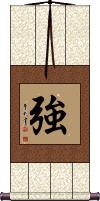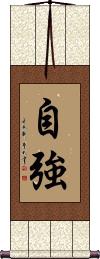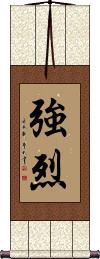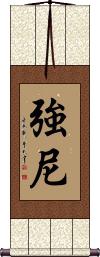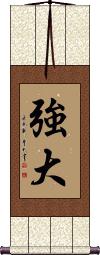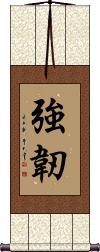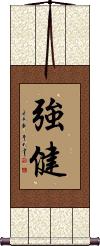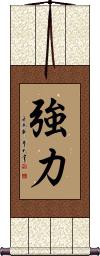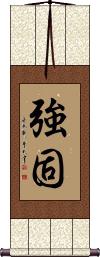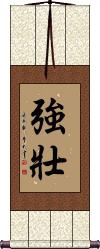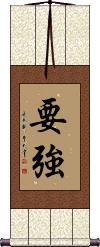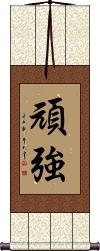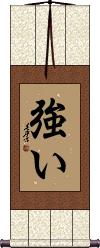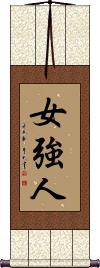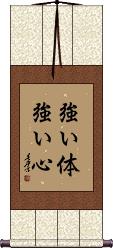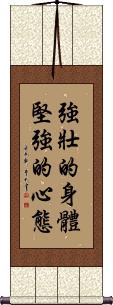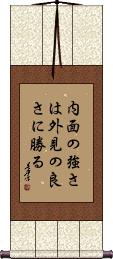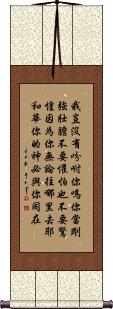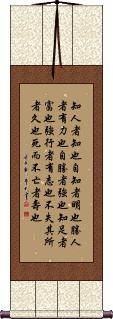Many custom options...
And formats...

強 in Chinese / Japanese...
Buy an 強 calligraphy wall scroll here!
Personalize your custom “強” project by clicking the button next to your favorite “強” title below...
2. Inner Strength / Self-Improvement
3. Intensity
4. Johnny
5. Jonny
7. Resiliency
10. Strength: Strong and Solid
12. Strong Minded
14. Tsuyoi
15. Resilient in the Face of Adversity
17. Strong Woman
18. Live Strong
19. No Pain No Gain
20. Always Striving for Inner Strength
21. Strong-Willed / Strong of Heart
22. Strong Hearted / Strong Willed
23. The Strong One
24. The Weak are Meat, The Strong Eat
25. Conquering Yourself is a Sign of Strength
26. Live Strong
28. Fierce and courageous training defeats the strong and protects the body.
30. Inner Strength is Better than Outward Appearance
31. Corinthians 13:4
32. Joshua 1:9
Strong / Powerful / Force
強 is a character that means strong, strength, force, powerful, better, stubborn, and stiff (yes, all of this in one character).
This “strong” has less to do with physical strength and more to do with having a winning attitude, or just having the ability to win at something.
Note that most of the time, this character is pronounced “qiang” but when used with the meaning of stubborn, unyielding, or stiff, it is pronounced “jiang” in Chinese.
Also, sometimes “qiang” is used in modern Chinese to describe people that do crazy things (For example: Bicycling from Beijing to Tibet alone). I sometimes can be found outside my Beijing apartment wearing nothing but shorts and a tee-shirt while eating ice cream during a snow storm, just to hear my neighbors call me “qiang.” Maybe they mean “strong” but perhaps they are using the new meaning of “crazy strong.”
強 can also be a Chinese surname that romanizes as Jiang in the mainland or Chiang if from Taiwan.
強 is a valid Korean Hanja character with the same meaning but is mostly used in compound Korean words.
強 is used in Japanese (though normally in compound words). In Japanese, it has the same meaning but in some contexts can mean “a little more than...” or “a little over [some amount].” Most Japanese would read this as tough, strength, stiff, hard, inflexible, obstinate, or stubborn.
The variant 彊 is sometimes seen in older literature.
Inner Strength / Self-Improvement
自強 is the kind of inner strength that applies to a person who has will-power and can inspire themselves to do great things.
自強 can also be the creed of a person that always pursues self-improvement.
Other translations: self-strengthening, striving for improvement, self-improvement, striving to become stronger, and self-renewal.
Intensity
強烈 means intensity in regard to strength.
Note: In some contexts, this can mean violently strong or severe.
Johnny
Jonny
Mighty / Powerful / Strong
強大 can mean mighty, powerful, large, formidable, or strong.
This term is often used to describe soldiers/troops/warriors and whole armies.
Resiliency
Robust / Sturdy
強健 means robustness or sturdiness in regards to being healthy and fit.
This can also be used to say “persistently good health.”
Herculean Strength
Strength: Strong and Solid
強固 means firmness, stability, security, and strength in Japanese.
It's not used commonly in China, but it means “powerful,” “firm,” “solid,” “strong,” or “better than others” in Chinese. There is a slight variation in the top of the first character between Chinese and Japanese. Because this is more of a Japanese word, we are showing the Japanese form here.
強固 is also a Korean word, but Korean Hanja uses the Chinese form of the first character (one tiny stroke is a little different), so just let me know if your audience is Korean when you place your order, and we'll have it written in the Chinese/Korean version.
Strong / Powerful
強壯 is an adjective that means powerful or strong.
It can also be translated as able-bodied, robust, or sturdy.
This version of strength also suggests muscularity.
![]() Note that the second character was simplified in Japan after WWII (also simplified in mainland China but not for calligraphy). If you want the modern Japanese/simplified version, please click on the Kanji shown to the right.
Note that the second character was simplified in Japan after WWII (also simplified in mainland China but not for calligraphy). If you want the modern Japanese/simplified version, please click on the Kanji shown to the right.
Strong Minded
Tenacious / Tenacity
頑強 means “Tenacious,” “Hard to Defeat,” or “Dogged.”
Alone, the first character means mischievous, obstinate, or stubborn. But it loses some of the mischievous meaning when the second character is added.
The second character means strength, force, power, or better.
Tsuyoi
Resilient in the Face of Adversity
打たれ強い is often used as a martial arts term.
It means being able to take a lot of punishment or being able to take a hit. In Japanese baseball, it can also refer to the pitcher's ability to keep his cool when the batter gets a hit. 打たれ強い is generally about being resilient and strong in the face of criticism or adversity.
Note: Because this selection contains some special Japanese Hiragana characters, it should be written by a Japanese calligrapher.
Love Faith Strength
愛信強 is the shortest way to write the word list, “love faith strength.”
The first character is love, the second is faith or believe, and the third means strong or strength.
It should be noted that word lists like this are not as natural sounding in Chinese as word lists can be in English. it’s more common to have a full phrase (with subject, verb, and object) or single words on calligraphy wall scrolls in Asia.
Strong Woman
女強人 is the best way to say “strong woman” or “strong and independent woman” in Chinese.
Grammar in China is a bit different, so these three characters literally read as “female strength person” or “woman strong person.” This might sound funny in English, but this is a natural-sounding title in Chinese.
Live Strong
While hard to translate directly, 堅強生活 is the best way to write “Live Strong” in Chinese. If you are a cancer survivor or support Lance Armstrong's ideas, this is a nice selection for a wall scroll.
The first two characters mean strong or staunch. The last two mean living or life (daily existence). While the Chinese version is the reverse order of “Live Strong” it is the only way to write it in a natural form that is grammatically correct.
Note that we are in no way affiliated or connected to Lance or his foundation. This translation is offered because of multiple requests from customers whose philosophies or ideas match those of the Live Strong idea.
No Pain No Gain
Literally: No Pain, No Strength
Always Striving for Inner Strength
自強不息 is a proverb or idiom that suggests that the pursuit of self-improvement is eternal. It can also be a suggestion to strive unremittingly in life.
The first two characters mean inner strength with the idea of self-improvement. The last two characters mean “never rest” or “striving without giving up.”
Some will translate these four characters as “Exert and strive hard without any let-up.”
Strong-Willed / Strong of Heart
気の強い means strong-willed or strong of heart in Japanese.
Here's the character breakdown of this Japanese title:
気 (ki) spirit; mind; heart; nature; motivation; intention; feelings; essence.
の (no) possessive particle.
強い (tsuyoi) strong; powerful; mighty; potent; resistant; resilient; durable.
Note: Because this selection contains some special Japanese Hiragana characters, it should be written by a Japanese calligrapher.
Strong Hearted / Strong Willed
意志堅強 can mean either “strong-hearted,” “strong-willed” or “determination.”
The first two characters can be translated as “will,” “willpower,” “determination,” “volition,” “intention,” or “intent.” But, it should be noted that this first part possesses the element of “heart” in the lower portion of both characters (they also partially carry the meaning “with the whole heart”).
The last two characters mean “strong” or “staunch.”
Chinese word order and grammar are a bit different than English, so in this case, they are in reverse order of English but have the correct meaning in a natural form.
The Strong One
The Weak are Meat, The Strong Eat
Meaning: Survival of the fittest
弱肉強食 is a Japanese and Chinese proverb that literally means “The weak are meat; the strong eat” or “The weak are prey to the strong.”
The closest English version is, “Survival of the fittest.” It also fits with the ideas of, “predatory behavior,” or “The law of the jungle.”
Conquering Yourself is a Sign of Strength
Live Strong
強く生きる is “Live Strong” in Japanese.
If you are a cancer survivor, or simply support Lance Armstrong's ideas, this is a nice selection for a wall scroll.
Note that we are in no way affiliated or connected to Lance, nor his foundation.
Note: Because this selection contains some special Japanese Hiragana characters, it should be written by a Japanese calligrapher.
Strong Body, Strong Mind
強い体強い心 is a way to write “strong mind, strong body” in Japanese.
Each of the two lines starts with 強い (tsuyoi) which means: strong; powerful; mighty; potent; resistant; resilient; durable; tough; stiff; hard; inflexible.
The body is represented with 体 (the ancient version is 體, romanized as karada), which means: body; build; physique; posture; torso; trunk; health.
Mind is represented with 心 (kokoro), which can mean heart, mind, or soul, depending on context.
強い體強い心 is not a common phrase in Japanese, so it's not the most natural title for calligraphy. In English, you might want to write it, “strong mind, strong body” but, “strong mind, strong body,” is more natural in Japanese.
Note: Because this selection contains some special Japanese Hiragana characters, it should be written by a Japanese calligrapher.
Fierce and courageous training defeats the strong and protects the body.
Strong Mind Strong Body
Inner Strength is Better than Outward Appearance
内面の強さは外見の良さに勝る is a Japanese proverb that literally translates as “inner/internal strength/power [versus] outward-appearance [the] merit/virtue/good quality [does] excel/surpass/exceed/outweigh.”
More naturally in English, this would be “Inner Strength Outweighs Outward Appearance.”
Note: Because this selection contains some special Japanese Hiragana characters, it should be written by a Japanese calligrapher.
Corinthians 13:4
愛は忍耐強い。愛は情け深い。ねたまない。愛は自慢せず、高ぶらない。is 1st Corinthians 13:4 in Japanese.
In English, this reads:
1st Corinthians 13:4 (KJV) Charity suffereth long, and is kind; charity envieth not; charity vaunteth not itself, is not puffed up...
1st Corinthians 13:4 (NIV) Love is patient, love is kind. It does not envy, it does not boast, it is not proud.
1st Corinthians 13:4 (Basic English) Love is never tired of waiting; love is kind; love has no envy; love has no high opinion of itself, love has no pride.
If you want a big “love” character written above the verse on your artwork, just make a note in the “special instructions” tab when you are customizing your artwork. There is no extra charge for that service on this special verse.
Note: Because this selection contains some special Japanese Hiragana characters, it should be written by a Japanese calligrapher.
Joshua 1:9
Here is the full translation of Joshua 1:9 into Chinese.
The text with punctuation:
我岂没有吩咐你吗?你当刚强壮胆。不要惧怕,也不要惊惶。因为你无论往哪里去,耶和华你的神必与你同在。
Hand-painted calligraphy does not retain punctuation.
This translation comes from the 1919 Chinese Union Bible.
For reference, from the KJV, this reads, “Have not I commanded thee? Be strong and of a good courage; be not afraid, neither be thou dismayed: for the LORD thy God is with thee whithersoever thou goest.”
Daodejing / Tao Te Ching - Chapter 33
This is referred to as passage or chapter 33 of the Dao De Jing (often Romanized as “Tao Te Ching”).
These are the words of the philosopher Laozi (Lao Tzu).
To know others is wisdom;
To know oneself is acuity/intelligence.
To conquer others is power,
To conquer oneself is strength.
To know contentment is to have wealth.
To act resolutely is to have purpose.
To stay one's ground is to be enduring.
To die and yet not be forgotten is to be long-lived.
To understand others is to be knowledgeable;
To understand yourself is to be wise.
To conquer others is to have strength;
To conquer yourself is to be strong.
To know when you have enough is to be rich.
To go forward with strength is to have ambition.
To not lose your place is to be long-lasting.
To die but not be forgotten -- that's true long life.
He who is content is rich;
He who acts with persistence has will;
He who does not lose his roots will endure;
He who dies physically but preserves the Dao
will enjoy a long after-life.
Notes:
During our research, the Chinese characters shown here are probably the most accurate to the original text of Laozi. These were taken for the most part from the Mawangdui 1973 and Guodan 1993 manuscripts which pre-date other Daodejing texts by about 1000 years.
Grammar was a little different in Laozi’s time. So you should consider this to be the ancient Chinese version. Some have modernized this passage by adding, removing, or swapping articles and changing the grammar (we felt the oldest and most original version would be more desirable). You may find other versions printed in books or online - sometimes these modern texts are simply used to explain to Chinese people what the original text really means.
This language issue can be compared in English by thinking how the King James (known as the Authorized version in Great Britain) Bible from 1611 was written, and comparing it to modern English. Now imagine that the Daodejing was probably written around 403 BCE (2000 years before the King James Version of the Bible). To a Chinese person, the original Daodejing reads like text that is 3 times more detached compared to Shakespeare’s English is to our modern-day speech.
Extended notes:
While on this Biblical text comparison, it should be noted, that just like the Bible, all the original texts of the Daodejing were lost or destroyed long ago. Just as with the scripture used to create the Bible, various manuscripts exist, many with variations or copyist errors. Just as the earliest New Testament scripture (incomplete) is from 170 years after Christ, the earliest Daodejing manuscript (incomplete) is from 100-200 years after the death of Laozi.
The reason that the originals were lost probably has a lot to do with the first Qin Emperor. Upon taking power and unifying China, he ordered the burning and destruction of all books (scrolls/rolls) except those pertaining to Chinese medicine and a few other subjects. The surviving Daodejing manuscripts were either hidden on purpose or simply forgotten about. Some were not unearthed until as late as 1993.
We compared a lot of research by various archeologists and historians before deciding on this as the most accurate and correct version. But one must allow that it may not be perfect, or the actual and original as from the hand of Laozi himself.
Not the results for 強 that you were looking for?
Below are some entries from our dictionary that may match your 強 search...
| Characters If shown, 2nd row is Simp. Chinese |
Pronunciation Romanization |
Simple Dictionary Definition |
強 强 see styles |
qiǎng qiang3 ch`iang chiang tsuyomi つよみ |
More info & calligraphy: Strong / Powerful / Force(suffix) (1) (ant: 弱・1) a little over; a little more than; (2) (ant: 弱・2) strength; the strong; (suffix) (3) powerhouse; one of the biggest; one of the most powerful; (suffix) (4) (after a number on the Japan Meteorological Agency seismic intensity scale; e.g. 5強) (ant: 弱・3) -upper (seismic intensity); (personal name) Tsuyomi Strong, forceful, violent; to force; to strengthen. |
強い see styles |
kowai こわい |
More info & calligraphy: Tsuyoi |
強健 强健 see styles |
qiáng jiàn qiang2 jian4 ch`iang chien chiang chien kyouken / kyoken きょうけん |
More info & calligraphy: Robust / Sturdy(noun or adjectival noun) robust (health); strong (constitution); sturdy |
強力 强力 see styles |
qiáng lì qiang2 li4 ch`iang li chiang li gouriki / goriki ごうりき |
More info & calligraphy: Herculean Strength(noun or adjectival noun) powerful; strong; (surname) Gouriki strength |
強固 see styles |
kyouko / kyoko きょうこ |
More info & calligraphy: Strength: Strong and Solid |
強壯 强壮 see styles |
qiáng zhuàng qiang2 zhuang4 ch`iang chuang chiang chuang |
More info & calligraphy: Strong / Powerful |
強大 强大 see styles |
qiáng dà qiang2 da4 ch`iang ta chiang ta kyoudai / kyodai きょうだい |
More info & calligraphy: Mighty / Powerful / Strong(noun or adjectival noun) mighty; powerful |
強烈 强烈 see styles |
qiáng liè qiang2 lie4 ch`iang lieh chiang lieh kyouretsu / kyoretsu きょうれつ |
More info & calligraphy: Intensity(noun or adjectival noun) strong; intense; severe |
強韌 强韧 see styles |
qiáng rèn qiang2 ren4 ch`iang jen chiang jen |
More info & calligraphy: Resiliency |
自強 自强 see styles |
zì qiáng zi4 qiang2 tzu ch`iang tzu chiang jikyou / jikyo じきょう |
More info & calligraphy: Inner Strength / Self-Improvement(noun/participle) strenuous effort |
要強 要强 see styles |
yào qiáng yao4 qiang2 yao ch`iang yao chiang |
More info & calligraphy: Strong Minded |
頑強 顽强 see styles |
wán qiáng wan2 qiang2 wan ch`iang wan chiang gankyou / gankyo がんきょう |
More info & calligraphy: Tenacious / Tenacity(adjectival noun) (1) stubborn; dogged; persistent; tenacious; (adjectival noun) (2) tough; sturdy; hardy; strong |
女強人 女强人 see styles |
nǚ qiáng rén nu:3 qiang2 ren2 nü ch`iang jen nü chiang jen |
More info & calligraphy: Strong Woman |
弱肉強食 弱肉强食 see styles |
ruò ròu qiáng shí ruo4 rou4 qiang2 shi2 jo jou ch`iang shih jo jou chiang shih jakunikukyoushoku / jakunikukyoshoku じゃくにくきょうしょく |
More info & calligraphy: The Weak are Meat, The Strong Eat(yoji) the law of the jungle; the strong prey on the weak; the weak become the victim of the strong |
気の強い see styles |
kinotsuyoi きのつよい |
More info & calligraphy: Strong-Willed / Strong of Heart |
自強不息 自强不息 see styles |
zì qiáng bù xī zi4 qiang2 bu4 xi1 tzu ch`iang pu hsi tzu chiang pu hsi |
More info & calligraphy: Always Striving for Inner Strength |
打たれ強い see styles |
utarezuyoi うたれづよい |
More info & calligraphy: Resilient in the Face of Adversity |
お強 see styles |
okowa おこわ |
(1) (food term) glutinous rice steamed with red beans or some other ingredient; (2) (archaism) trickery; deception |
一強 see styles |
ikkyou / ikkyo いっきょう |
dominant player (e.g. in politics); single strong player |
三強 see styles |
sankyou / sankyo さんきょう |
(noun - becomes adjective with の) (See 強・2) top three |
二強 see styles |
nikyou / nikyo にきょう |
(See 強・2) top two |
佐強 see styles |
sakyou / sakyo さきょう |
(given name) Sakyō |
倔強 倔强 see styles |
jué jiàng jue2 jiang4 chüeh chiang kukkyou / kukkyo くっきょう |
stubborn; obstinate; unbending (adj-na,n,adj-no) robust; brawny; muscular; strong; sturdy |
八強 八强 see styles |
bā qiáng ba1 qiang2 pa ch`iang pa chiang |
(sports) top eight; quarterfinals |
列強 列强 see styles |
liè qiáng lie4 qiang2 lieh ch`iang lieh chiang rekkyou / rekkyo れっきょう |
the Great Powers (history) major powers of the world; great powers |
制強 see styles |
seigou / sego せいごう |
(personal name) Seigou |
剛強 刚强 see styles |
gāng qiáng gang1 qiang2 kang ch`iang kang chiang tsuyotake つよたけ |
firm; unyielding (noun or adjectival noun) strength; firmness; (personal name) Tsuyotake stiff |
力強 力强 see styles |
lì qiáng li4 qiang2 li ch`iang li chiang rikigō |
powerful |
功強 功强 see styles |
gōng qiáng gong1 qiang2 kung ch`iang kung chiang kugō |
effectiveness |
加強 加强 see styles |
jiā qiáng jia1 qiang2 chia ch`iang chia chiang |
to reinforce; to strengthen; to enhance |
Click here for more 強 results from our dictionary
The following table may be helpful for those studying Chinese or Japanese...
| Title | Characters | Romaji (Romanized Japanese) | Various forms of Romanized Chinese | |
| Strong Powerful Force | 強 强 | kyou / kyo | qiáng / qiang2 / qiang | ch`iang / chiang |
| Inner Strength Self-Improvement | 自強 自强 | zì qiáng / zi4 qiang2 / zi qiang / ziqiang | tzu ch`iang / tzuchiang / tzu chiang | |
| Intensity | 強烈 强烈 | kyouretsu / kyoretsu | qiáng liè qiang2 lie4 qiang lie qianglie | ch`iang lieh chianglieh chiang lieh |
| Johnny | 強尼 强尼 | qiáng ní / qiang2 ni1 / qiang ni / qiangni | ch`iang ni / chiangni / chiang ni | |
| Jonny | 強尼 强尼 | qiáng ní / qiang2 ni1 / qiang ni / qiangni | ch`iang ni / chiangni / chiang ni | |
| Mighty Powerful Strong | 強大 强大 | kyoudai / kyodai | qiáng dà / qiang2 da4 / qiang da / qiangda | ch`iang ta / chiangta / chiang ta |
| Resiliency | 強韌 强韧 | qiáng rèn qiang2 ren4 qiang ren qiangren | ch`iang jen chiangjen chiang jen |
|
| Robust Sturdy | 強健 强健 | kyouken / kyoken | qiáng jiàn qiang2 jian4 qiang jian qiangjian | ch`iang chien chiangchien chiang chien |
| Herculean Strength | 強力 强力 | kyou ryoku / kyouryoku / kyo ryoku | qiáng lì / qiang2 li4 / qiang li / qiangli | ch`iang li / chiangli / chiang li |
| Strength: Strong and Solid | 強固 强固 | kyouko / kyoko | qiáng gù / qiang2 gu4 / qiang gu / qianggu | ch`iang ku / chiangku / chiang ku |
| Strong Powerful | 強壯 强壮 | kyousou / kyoso | qiáng zhuàng qiang2 zhuang4 qiang zhuang qiangzhuang | ch`iang chuang chiangchuang chiang chuang |
| Strong Minded | 要強 要强 | yào qiáng yao4 qiang2 yao qiang yaoqiang | yao ch`iang yaochiang yao chiang |
|
| Tenacious Tenacity | 頑強 顽强 | gan kyou / gankyou / gan kyo | wán qiáng wan2 qiang2 wan qiang wanqiang | wan ch`iang wanchiang wan chiang |
| Tsuyoi | 強い | tsuyoi | ||
| Resilient in the Face of Adversity | 打たれ強い | u ta re tsuyo i utaretsuyoi | ||
| Love Faith Strength | 愛信強 爱信強 | ài xìn qiáng ai4 xin4 qiang2 ai xin qiang aixinqiang | ai hsin ch`iang aihsinchiang ai hsin chiang |
|
| Strong Woman | 女強人 女强人 | nǚ qiáng rén nv3 qiang2 ren2 nv qiang ren nvqiangren | nü ch`iang jen nüchiangjen nü chiang jen |
|
| Live Strong | 堅強生活 坚强生活 | jiān qiáng shēng huó jian1 qiang2 sheng1 huo2 jian qiang sheng huo jianqiangshenghuo | chien ch`iang sheng huo chienchiangshenghuo chien chiang sheng huo |
|
| No Pain No Gain | 不痛不強 不痛不强 | bú tòng bù qiáng bu2 tong4 bu4 qiang2 bu tong bu qiang butongbuqiang | pu t`ung pu ch`iang putungpuchiang pu tung pu chiang |
|
| Always Striving for Inner Strength | 自強不息 自强不息 | zì qiáng bú xī zi4 qiang2 bu2 xi1 zi qiang bu xi ziqiangbuxi | tzu ch`iang pu hsi tzuchiangpuhsi tzu chiang pu hsi |
|
| Strong-Willed Strong of Heart | 氣の強い 気の強い | ki no tsuyo i kinotsuyoi | ||
| Strong Hearted Strong Willed | 意志堅強 意志坚强 | yì zhì jiān qiáng yi4 zhi4 jian1 qiang2 yi zhi jian qiang yizhijianqiang | i chih chien ch`iang ichihchienchiang i chih chien chiang |
|
| The Strong One | 強いもの | tsuyoi mono tsuyoimono | ||
| The Weak are Meat, The Strong Eat | 弱肉強食 | jaku niku kyoo shoku jakunikukyooshoku jaku niku kyo shoku | ruò ròu qiáng shí ruo4 rou4 qiang2 shi2 ruo rou qiang shi ruorouqiangshi | jo jou ch`iang shih jojouchiangshih jo jou chiang shih |
| Conquering Yourself is a Sign of Strength | 自勝者強也 | zì shèng zhě qiáng yě zi4 sheng4 zhe3 qiang2 ye3 zi sheng zhe qiang ye zishengzheqiangye | tzu sheng che ch`iang yeh tzushengchechiangyeh tzu sheng che chiang yeh |
|
| Live Strong | 強く生きる | tsuyoku ikiru tsuyokuikiru | ||
| Strong Body, Strong Mind | 強い體強い心 強い体強い心 | tsuyo i karada tsuyo i kokoro tsuyoikaradatsuyoikokoro | ||
| Fierce and courageous training defeats the strong and protects the body. | 剛勇之猛練勝強而保體 刚勇之猛练胜强而保体 | gāng yǒng zhī měng liàn shèng qiáng ér bǎo tǐ gang1 yong3 zhi1 meng3 lian4 sheng4 qiang2 er2 bao3 ti3 gang yong zhi meng lian sheng qiang er bao ti | kang yung chih meng lien sheng ch`iang erh pao t`i kang yung chih meng lien sheng chiang erh pao ti |
|
| Strong Mind Strong Body | 強壯的身體堅強的心態 强壮的身体坚强的心态 | qiáng zhuàng de shēn tǐ jiān qiáng de xīn tài qiang2 zhuang4 de shen1 ti3 jian1 qiang2 de xin1 tai4 qiang zhuang de shen ti jian qiang de xin tai | ch`iang chuang te shen t`i chien ch`iang te hsin t`ai chiang chuang te shen ti chien chiang te hsin tai |
|
| Inner Strength is Better than Outward Appearance | 内面の強さは外見の良さに勝る | naimen no tsuyosa ha gaiken no yosa ni masaru | ||
| Corinthians 13:4 | 愛は忍耐強い。愛は情け深い。ねたまない。愛は自慢せず、高ぶらない。 | ai ha nintai tsuyoi. ai ha nasakebukai. netama nai. ai ha jiman se zu, takabura nai. | ||
| Joshua 1:9 | 我豈沒有吩咐你嗎你當剛強壯膽不要懼怕也不要驚惶因為你無論往哪里去耶和華你的神必與你同在 我岂没有吩咐你吗你当刚强壮胆不要惧怕也不要惊惶因为你无论往哪里去耶和华你的神必与你同在 | wǒ qǐ méi yǒu fēn fù nǐ ma nǐ dāng gāng qiáng zhuàng dǎn bù yào jù pà yě bù yào jīng huáng yīn wèi nǐ wú lùn wǎng nǎ lǐ qù yē hé huá nǐ de shén bì yǔ nǐ tóng zài wo3 qi3 mei2 you3 fen1 fu4 ni3 ma ni3 dang1 gang1 qiang2 zhuang4 dan3 bu4 yao4 ju4 pa4 ye3 bu4 yao4 jing1 huang2 yin1 wei4 ni3 wu2 lun4 wang3 na3 li3 qu4 ye1 he2 hua2 ni3 de shen2 bi4 yu3 ni3 tong2 zai4 wo qi mei you fen fu ni ma ni dang gang qiang zhuang dan bu yao ju pa ye bu yao jing huang yin wei ni wu lun wang na li qu ye he hua ni de shen bi yu ni tong zai | wo ch`i mei yu fen fu ni ma ni tang kang ch`iang chuang tan pu yao chü p`a yeh pu yao ching huang yin wei ni wu lun wang na li ch`ü yeh ho hua ni te shen pi yü ni t`ung tsai wo chi mei yu fen fu ni ma ni tang kang chiang chuang tan pu yao chü pa yeh pu yao ching huang yin wei ni wu lun wang na li chü yeh ho hua ni te shen pi yü ni tung tsai |
|
| Daodejing Tao Te Ching - Chapter 33 | 知人者知也自知者明也勝人者有力也自勝者強也知足者富也強行者有志也不失其所者久也死而不亡者壽也 知人者知也自知者明也胜人者有力也自胜者强也知足者富也强行者有志也不失其所者久也死而不亡者寿也 | zhī rén zhě zhī yě zì zhī zhě míng yě shèng rén zhě yǒu lì yě zì shèng zhě qiáng yě zhī zú zhě fù yě qiáng xíng zhě yǒu zhì yě bù zhī qí suǒ zhě jiǔ yě sǐ ér bù wáng zhě shòu yě zhi1 ren2 zhe3 zhi1 ye3 zi4 zhi1 zhe3 ming2 ye3 sheng4 ren2 zhe3 you3 li4 ye3 zi4 sheng4 zhe3 qiang2 ye3 zhi1 zu2 zhe3 fu4 ye3 qiang2 xing2 zhe3 you3 zhi4 ye3 bu4 zhi1 qi2 suo3 zhe3 jiu3 ye3 si3 er2 bu4 wang2 zhe3 shou4 ye3 zhi ren zhe zhi ye zi zhi zhe ming ye sheng ren zhe you li ye zi sheng zhe qiang ye zhi zu zhe fu ye qiang xing zhe you zhi ye bu zhi qi suo zhe jiu ye si er bu wang zhe shou ye | chih jen che chih yeh tzu chih che ming yeh sheng jen che yu li yeh tzu sheng che ch`iang yeh chih tsu che fu yeh ch`iang hsing che yu chih yeh pu chih ch`i so che chiu yeh ssu erh pu wang che shou yeh chih jen che chih yeh tzu chih che ming yeh sheng jen che yu li yeh tzu sheng che chiang yeh chih tsu che fu yeh chiang hsing che yu chih yeh pu chih chi so che chiu yeh ssu erh pu wang che shou yeh |
|
| In some entries above you will see that characters have different versions above and below a line. In these cases, the characters above the line are Traditional Chinese, while the ones below are Simplified Chinese. | ||||
Successful Chinese Character and Japanese Kanji calligraphy searches within the last few hours...
